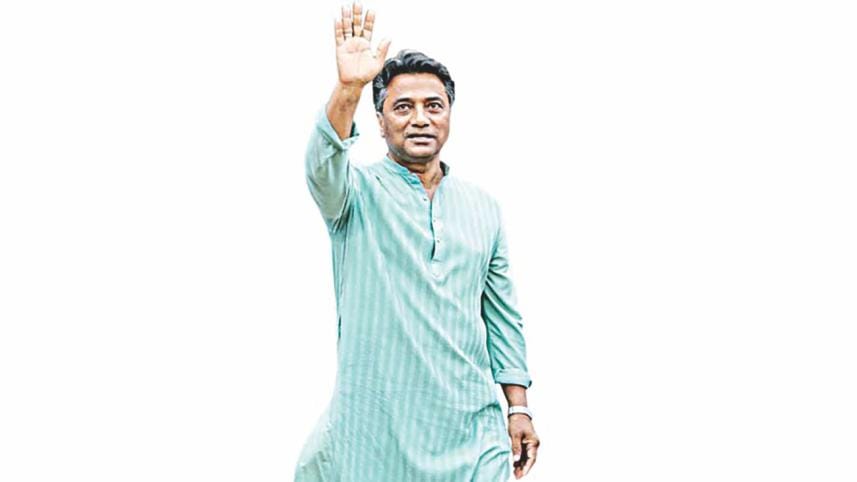Our 'one-in-a-million' man

Every time a tragedy makes an unannounced entry, our lives turn into a pile of grieving memories. Once struck by loss, one moves on to a totally different plane where laughter is almost immediately followed by a fear of an unknown tomorrow. Yet life goes on and continues as scheduled and as infantile egomaniacs, we continue deluding ourselves with promises to last forever. And finally, when people closest to you evaporate into thin air, one wonders if they've turned into shadows.
It was just the other day I conversed with a shadow. That shadow, I believe, was of my husband. I believe that he watches us, talks to us and continues being with us through all we do. He sits opposite me in my office, tucked away in a corner where a knitted jacquard version of his portrait occupies the sofa…
Watching him evolve from a TV anchor persona to a businessman and business leader, and then a full on public servant was the biggest joy in my life. I take pride in his making, just because I was right by his side while all of this happened. True, our holidays were the shortest; true, we spent most of our time working and preparing for the future, blissfully ignorant of the immediacy of tragedy. My warnings to him about not having lived life enough had gone in vain. While I watched him sign piles of files till late at night, and fussed about his health, he chose to ignore all of that and reminded me that his work was important. Work always is important. But in a scale of comparison, where would you rate life to be, I asked. He never had good answers for those kinds of questions that I would throw at him. Even he was an unprepared man when it came to life.
After having suffered bouts of dizziness in Dhaka ever since the beginning of July 2017, when we braved the trip to London and saw the doctors, all hell had broken loose. A relatively unknown disease, primary cerebral vasculitis, had struck him, and Dr Raj Kapoor, consultant at National Hospital for Neurology and Neurosurgery at Queens Square London, upon MRI/MRA findings, confirmed this to us on August 1, 2017. He also said that this was a disease that one in a million have. He was indeed our one-in-a-million man. His blood vessels had shrunk and blood wasn't flowing into the brain.
From August 15 till November 30, Annis remained in a coma, leaving us wondering about his level of consciousness.
I watched a man, enamoured by life, suddenly fall from having a hyperactive mind to a level of minimally low consciousness in less than two weeks. Ironically, two and a half years back, he was the same man with whom we couldn't keep up when we walked or ran with him, while campaigning with the "Amra Dhaka" slogan for his election as mayor of Dhaka North City Corporation. He lay there, in Queens Square in London, for three straight months, and another in Wellington, while my children and I looked for signs of his awareness. At that point, I began to wonder whether consciousness was an all-or-nothing phenomenon or whether it could be present in scales. A quick reading of Into the Gray Zone: A Neuroscientist Explores the Border Between Life and Death by Adrian Owen helped. I read the story of Adrian meeting Kate, a young teacher from Cambridge, England, who, although had sleep-wake cycles, was not consciously aware. For years, Adrian tried communicating with her, assessing her through fMRI (functional MRI), prompting her brain to take commands in order to function.
This gave me hope. Processes like caloric vestibular stimulation, which helped patients in comatose state by irrigating water through the ears, became music to my ears. I read up on deep brain stimulation, along with other random miracle drugs like Zolpidem, a sleep medicine that woke brain-injured patients. The absurd had become the obvious while my journey for neuro-rehabilitation stretched from Germany, London, Kent, Surrey and finally to even Singapore…
Annis often admired Suchitra Sen for having avoided the camera in order to make people remember her only as the star from the past. I, too, knew that he wanted to remain in public memory as a handsome hero… a real-life hero who never wore any designer clothing, never had any expensive watches, who relied on the factory to sew his kurtas, and yet somehow managed to look very impressive. The only aspiration that he had was to die in glory. His wish was granted. He left me and my children with the richest heritage ever of being the wife and children of a man-in-a-million who tried his hardest to serve the constituency that had elected him, with utmost passion and commitment.
November 30 marks the first anniversary of his crossing over. For us, he's just in the next room, preparing to make a re-entry. Meanwhile, we draw from his strength and will to move on with a goal to make tomorrow a better day for as many lives as we can, with whatever little or more we have. Life cannot be tragic; it must be measured qualitatively and by that standard, Annis's physical departure has gone down in the pages of history as an episode not of regret, but of celebration.
Thus, on November 30, my children and I don't plan to mourn, rather, on that day, we plan to reminisce about his only passion that mattered the most: work.
Life, after all, is too precious to be laced with regrets.
Dr Rubana Huq is the managing director of Mohammadi Group. Her Twitter handle is @Rubanah.




Comments